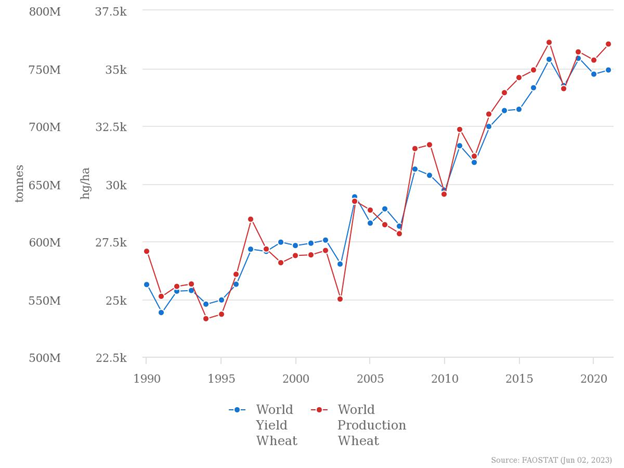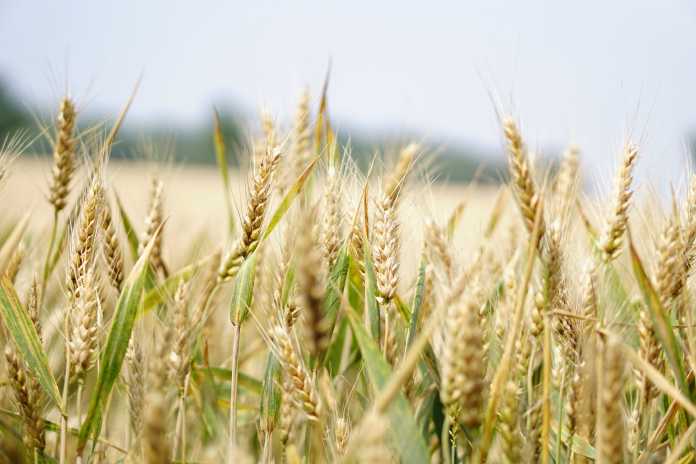A story on NBC News cites worst case scenarios to claim that climate change threatens global wheat production. This is false. Hard data shows wheat production has grown dramatically during the recent period of climate change, and agronomy explains why the world should expect such increases in production and yield to continue for the foreseeable future.
The NBC News story, “World’s wheat supply at risk of a dangerous shock due to heat and drought, study warns,” cites the results of a single study recently published in npj Climate and Atmospheric Science to warn that, “[n]ew research outlines a worst-case scenario in which extreme weather hammers winter wheat crops in both the U.S. Midwest and northeastern China in the same year.”
The researchers used a unique set of climate models, the UNprecedented Simulated Extreme Ensemble (UNSEEN), to simulate what they write are 1,000s of, “plausible unprecedented events” some of which included simultaneous collapses of wheat production in both China, the world’s top wheat producing and consuming country, and the United States, the world’s fourth largest wheat producer and among the top exporters.
The fact that the events simulated are “unprecedented,” in history suggests that they are not actually that “plausible,” or that they are likely to be driven by the present modest climate change, in terms of the Holocene, much less in the geologic history of the earth.
That should have been NBC News’ first clue not to make too much of this study.
Concerning the fact that the scenario is implausible in the extreme, Erin Coughlan de Perez, the study’s lead author and an associate professor at Tufts University, told NBC News, “We’re suffering from a failure of imagination in terms of what this could look like.” Lack of imagination, indeed.
In a world of limited resources, Coughlan de Perez would have us plan for exceedingly unlikely, unprecedented catastrophes, rather than focusing laser-like on more realistic possible outcomes of a changing climate.
The second clue that the study’s “worst case scenario” claims were exceedingly unlikely to ever occur should have been the fact that contrary to what the study claimed, “climate change is [not] causing unprecedented events globally.
As explored at Climate Realism and Climate at a Glance, climate change is not causing a increase in the number or severity of droughts or heatwaves.
What about wheat yields and production. Data from the U.N. Food and Agriculture Organization show that even as the Earth has modestly warmed since 1990 global wheat yields and production have both increased dramatically. (See the figure, below).

Agronomy explains that a large part of the reason for the wheat increase is due to the improved fertilization effect of rising carbon dioxide levels, a decline in late season frosts, longer growing seasons, generally improved moisture conditions in the worlds major growing regions, and plants’ improved abilities to use water efficiently. There is no reason to believe any of these conditions will worsen should the Earth continue its modest trajectory of warming in the foreseeable future.
A variety of occurrences, drought, war, economic collapse, pandemics or other events over a single or string of years combined could disrupt wheat production for a short-time. But outside of unrealistic extreme computer models simulations or science fiction type scenarios produced by the minds of Hollywood script writers for a “Day After Tomorrow” type movies, there little reason to believe that wheat production could be significantly retarded long-term; unless politicians intervene to prematurely end the use of fossil fuels.
Data shows extreme weather events are not increasing. No realistic global warming scenario indicates either that such an increase is in the offing or that in the future extreme weather events will the erupt simultaneously in some unprecedented fashion across the far-flung wheat producing regions around the globe, causing a significant long-term decline in wheat production. NBC News should quit scaring its audience with stories based on “worst case scenarios” that in the real world are exceedingly unlikely to arise.

















